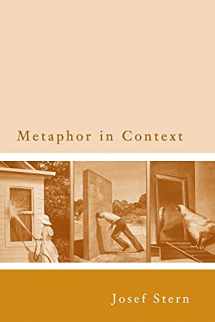
Metaphor in Context (Bradford Book)
ISBN-13:
9780262529587
ISBN-10:
0262529580
Edition:
Reprint
Author:
Josef Stern
Publication date:
2016
Publisher:
MIT Press
Format:
Paperback
406 pages
Category:
Semantics
,
Words, Language & Grammar
,
Cognitive Psychology
,
Behavioral Sciences
,
Cognitive
,
Psychology
FREE US shipping
Book details
ISBN-13:
9780262529587
ISBN-10:
0262529580
Edition:
Reprint
Author:
Josef Stern
Publication date:
2016
Publisher:
MIT Press
Format:
Paperback
406 pages
Category:
Semantics
,
Words, Language & Grammar
,
Cognitive Psychology
,
Behavioral Sciences
,
Cognitive
,
Psychology
Summary
Metaphor in Context (Bradford Book) (ISBN-13: 9780262529587 and ISBN-10: 0262529580), written by authors
Josef Stern, was published by MIT Press in 2016.
With an overall rating of 4.0 stars, it's a notable title among other
Semantics
(Words, Language & Grammar , Cognitive Psychology, Behavioral Sciences, Cognitive, Psychology) books. You can easily purchase or rent Metaphor in Context (Bradford Book) (Paperback) from BooksRun,
along with many other new and used
Semantics
books
and textbooks.
And, if you're looking to sell your copy, our current buyback offer is $0.3.
Description
Josef Stern addresses the question: Given the received conception of the form and goals of semantic theory, does metaphorical interpretation, in whole or part, fall within its scope?The many philosophers, linguists, and cognitive scientists writing on metaphor over the past two decades have generally taken for granted that metaphor lies outside, if not in opposition to, received conceptions of semantics and grammar. Assuming that metaphor cannot be explained by or within semantics, they claim that metaphor has little, if anything, to teach us about semantic theory. In this book Josef Stern challenges these assumptions. He is concerned primarily with the question: Given the received conception of the form and goals of semantic theory, does metaphorical interpretation, in whole or part, fall within its scope? Specifically, he asks, what (if anything) does a speaker-hearer know as part of her semantic competence when she knows the interpretation of a metaphor?According to Stern, the answer to these questions lies in the systematic context-dependence of metaphorical interpretation. Drawing on a deep analogy between demonstratives, indexicals, and metaphors, Stern develops a formal theory of metaphorical meaning that underlies a speaker's ability to interpret a metaphor. With his semantics, he also addresses a variety of philosophical and linguistic issues raised by metaphor. These include the interpretive structure of complex extended metaphors, the cognitive significance of metaphors and their literal paraphrasability, the pictorial character of metaphors, the role of similarity and exemplification in metaphorical interpretation, metaphor-networks, dead metaphors, the relation of metaphors to other figures, and the dependence of metaphors on literal meanings. Unlike most metaphor theorists, however, who take these problems to be sui generis to metaphor, Stern subsumes them under the same rubric as other semantic facts that hold for nonmetaphorical language.


We would LOVE it if you could help us and other readers by reviewing the book
Book review

Congratulations! We have received your book review.
{user}
{createdAt}
by {truncated_author}


